The Power of Simplicity
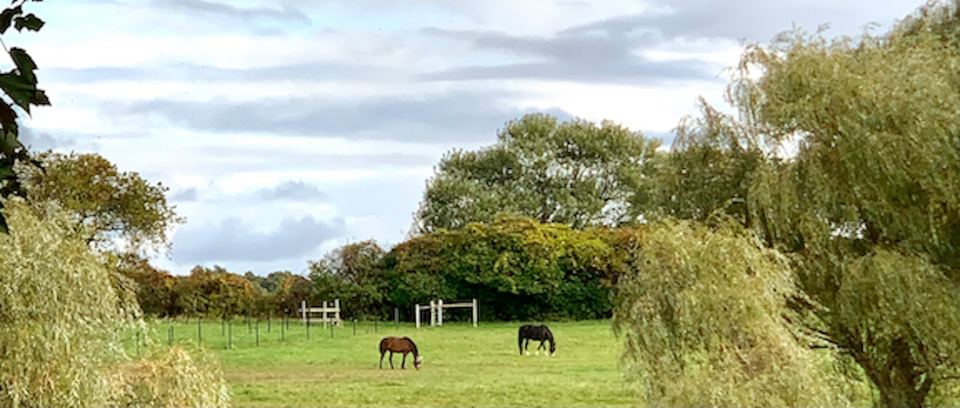
Fall has brought a richness and depth to Levi's life at the farm, in positive ways that I will try my best to express. The end of summer accompanied an exodus of long-term boarders, emptying the farm; however, these were swiftly replaced with wonderful, exciting new energy from new people and horses who are actively training and working across multiple disciplines. We now have hunters, jumpers, dressage folks, trail riders, a driving pony (huzzah!), and multiple liberty enthusiasts. We have hosted clinics and workshops that were met with great enthusiasm among the boarders. There is always something going on, and every day horses and riders truck in and out of the property, with lots of smiles and tales of adventures from the woods, the hunt field, the beach, the clinic or show. With the appearance of several new geldings, Levi and Oliver were also blessed with the opportunity for two new pasture mates in Karamo (the black horse with the blaze featured in the images) and Mozart (the Friesian horse in the photo below). All four geldings get along splendidly, and Levi finally has both the herd of his dreams and the field of his dreams. I truly can't express just how happy this has made the both of us.
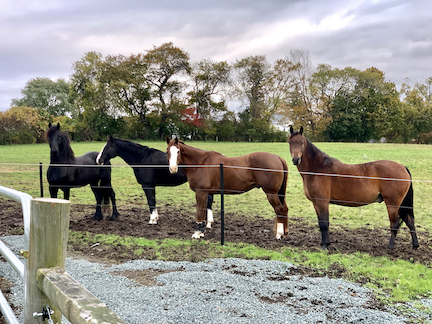
Although he is the lowest ranking member of the herd, Levi has made peace with this and accepts his role with gratitude. He is becoming even softer in his behavior due to this, and seems to feel safe enough to reveal some emotions he had never shown me before. The older geldings look out for him, discipline him when needed, and have established rank and order among themselves. They are on their own schedule! They are also a hoot to deal with as a group, largely due to the 'main character' energy of Mozart, the new herd leader, and the dynamics of the other horse's personalities mixing in as well. Oliver and Karamo are both Appendix (the so-called American Warmblood, a Thoroughbred/Quarter Horse cross) who are both eventers; these are well-trained, workmanlike horses who would not put a foot wrong. They appear to be middle ranking members due to their lack of desire to scrap for the role of leader, or be lowest on the totem pole, but they have the backbone to assert themselves as needed. Within their calm, steady natures lies a richness of life experience and greatness of heart. The body types and condition of all four horses reflect their unique breeding and purpose. It is so interesting to compare differences across the breeds (Morgan, Appendix, Friesian), both anatomically as well as how their training and use has literally shaped them. We also see the impact of age here, with a discerning eye capable of recognizing that Levi is very young still, at only four, and lacks the base of conditioning and the skeletal maturity of the other three geldings, who are all older than him by a decade or more. (In fact, Levi is in a growth spurt at the moment, with his body lengthening rather than growing taller!). We can also note the much higher natural head set for both the Morgan and the Friesian in comparison to the Appendix horses, with the most striking difference in body composition and conformation between Mozart and the other three geldings. Anatomy drives function to a large degree, and this should be respected; we would not force an unnaturally low head set onto the Friesian or the Morgan when in frame.
Mozart, the Friesian herd leader, is truly worth writing about; this is the type of horse I really enjoy and find delightful. He has a very confident, extroverted, dynamic, larger-than-life personality, and freely expresses a lot of opinions, but with softness in his demeanor toward people, which is exactly the kind of horse I love dealing with. He is a talker and a communicator and loves to be the center of attention. Based on what his owner and others have said, he does not appear to be an easy horse by any means, but if no one had told me that I would never have thought so, which is always interesting to me. The mental image he invokes to me is of a gentleman in a designer suit who has just stepped away from rubbing elbows at a black-tie affair to whimsically start a happy little campfire in the woods, because why not? Although he is a smaller Friesian, standing only an inch or two taller than the other three geldings, his movement is perhaps the most beautiful I've seen in some time. I will definitely try to get a video of him in motion soon! Mozart was a dressage horse (probably a show horse) and a schoolmaster, but unfortunately he suffered a suspensory ligament injury sometime in his younger years (I believe, but will confirm with his owner) and is only able to do light riding now. He is in very good hands with his new owner who is taking it step by step with him, and I am excited for the both of them. However, Mozart appears to very much need and want a job, and is quite indignant whenever I fetch baby Levi out of the field to train, thereby committing the great sin of ignoring him! Like the other horses at the farm, he witnesses us routinely out training in full view, and he always looks so disappointed in me that I would choose Levi: "What are you doing with that infant?! I should be next for training!" As if to prove his point, he will galavant around impatiently while I am working with Levi, demonstrating movement that would make a dressage rider cry with happiness. Mozart does not simply trot, he floats. His preferred way of going is Swan Lake. While I am hoping to get just four strides of correct bend before I declare victory for the day, Mozart has already written us a love song with his canter out in the paddock. What horses get up to on their own time tells you a lot of what you need to know about them. Much like his namesake, he has the the fire and the talent to back it up, and I really hope Levi will learn a thing or two from being around him. If Mozart was a driving horse, I'd love to put him to a Spider Phaeton and roar around like Gentleman Jack! In all seriousness, there is no external influence on these horses that affects their behavior beyond how they are naturally choosing to express themselves. These horses are managed and handled very humbly and simply: go out to the pasture quietly in pairs, spend the day outside roaming and grazing and engaging in herd behaviors, maybe someone is fetched away for an hour or two for training or riding, go back inside before dark, and everyone has hay to last the night in their clean beds. These geldings are required to behave quietly and politely with people, all the time, and simple web or rope halters are used in their management. No drama, no fuss. Expectations are kept clear and the routine is simple, and this seems to be the best way.
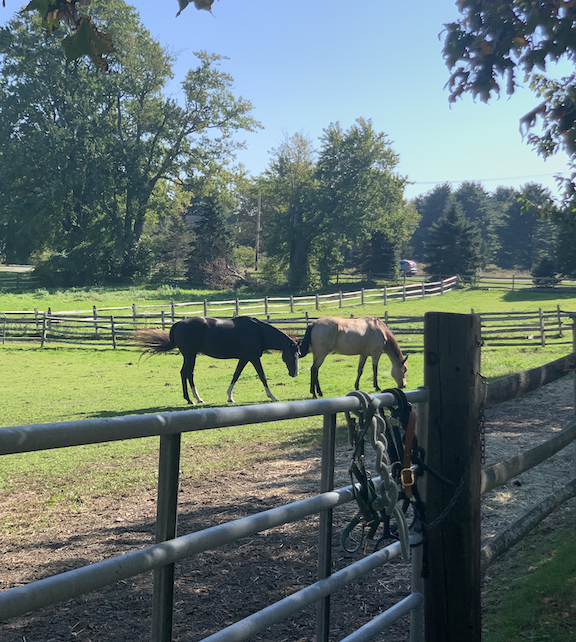
Outside of herd life, Levi and I have picked up the training pace and are back working under cart. Joe and I can manage just two days per week with Levi in the cart - as I mentioned, Joe is my header, and I don't drive without a header present, at least not at this time, so we are dependent on his availability for driving. I've also discerned that Levi gives his best efforts when we mix up the driving days rather than in cart on consecutive days, so while I'd like to do more under cart, he's telling me what he can manage without becoming overwhelmed.
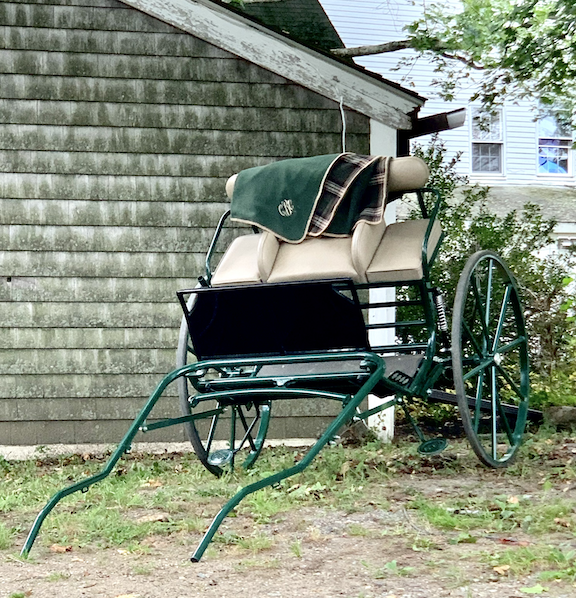
Asking Levi to drive his cart is not an easy thing for him, even after such careful and long preparation as we have given him, and I am so mindful of this. It's not just the physical exertion and effect on his body, but truly, also his mind. I mentioned above that Levi is beginning to show another side of his personality to me during this process. Since our addition of the equine biomechanics training via Amy Skinner's protocols (I highly recommend the Posture class she offers through her website (https://www.amyskinnerhorsemanship.com/services) which has been transformative for us), I have seen not just a physical change in Levi which occurred almost overnight (as is obvious in the recently taken photo below), but also an emotional one that has also coincided with his new experience being in a true herd. Horses do not feel safe outside of large groups of their own species, and nothing can really take the place of this; as this is the first time we've had Levi in a full herd situation, I don't know if his emotional changes are due to that, or reflect the work we are doing, or some combination of these. Be it from training or meeting that basic equine need, I welcome it, because anything he feels safe enough to show me is always seen and heard.
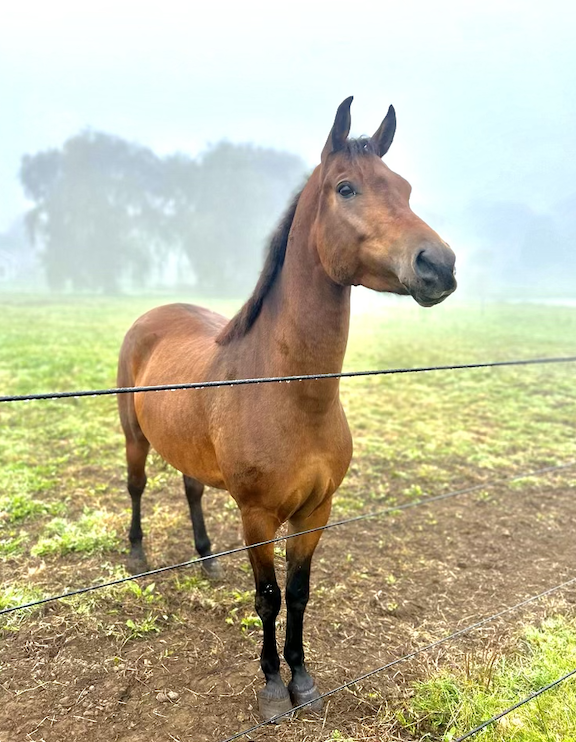
Levi is, as I've often mentioned, a very self-confident horse - perhaps confident to the point of arrogance - yet, despite this, he is truly not an independent horse. Frankly, he is a horse that needs a significant amount of support from everyone around him including other horses, and has since the day I met him. This is no problem or fault whatsoever, just a feature of his personality that is of interest and needs to be accounted for in training routines. As a result, we have been steadily working on developing independence and self-carriage to help him support himself physically and emotionally. Part of this work involves helping him create better biomechanical balance, putting him into a more solid frame underlying increased forwardness, setting him up for success. In this process, his emotional state can't be ignored. Because I spend so much time with this horse, I know very well how he reacts to even the smallest of things, both emotionally and physically. He is very expressive and I have always encouraged that, never punishing him for showing how he feels even if he vehemently disagrees with me. He is never punished for showing emotions unless it is paired with a threat or dangerous behavior. I've implemented much of the attunement philosophy of the excellent modern trainer Warwick Schiller, whose CAT-H approach has revolutionized my thinking about training. If interested, you can find out more about Schiller's work here: https://warwickschiller.com/. Merriam-Webster defines attunement as to bring into harmony, which I feel is an apt description of what I am aiming for in working with my young horse.
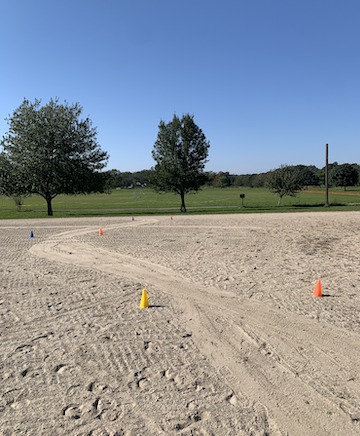
In adopting attunement as a training modality, I have discovered so much about Levi's behavior and its foundations, and as a result I am always deeply in focus with him. Levi has developed much trust and confidence in me which I cherish and would never risk losing, and he feels freer to express himself even over small things. Over the past few weeks during our work on improving posture, I noticed how much he was, in many ways, actually quite worried and concerned about his environment and his place in it, and has to a large degree been hiding this from me, or at least I have sadly failed to notice it when it was offered in glimpses. This was something he had not shown me before, but as I began working with him more from the right side, he seemed to open up more, revealing this other aspect of himself which had been masked by what feels more like brashness or boldness, or guardedness. In response, I have spent a great deal of time encouraging him, giving whatever I can in the moment, protecting him without blocking his natural curiosity, and respecting his thresholds as he sets them, and I am so beyond pleased to witness that worry and concern slowly melting away by the day, giving over to confidence and a newfound emotion that feels more like offered fragility, but with a tiny flame of strength within it at the same time (if that makes sense).

This fragility, this vulnerability in him, is more evident when we are working under cart, and it makes perfect sense for him to feel that way: he is out there, in front, on his own, as independent as he can be - he is perhaps feeling that he is "taking care of me" in the cart, and he knows this. We are mirroring each other, as I am vulnerable as well. I am trusting him by putting my body in the carriage. He is alone out there, with just my hands, my voice, and whip to guide him. He cannot see me and he has to remember how to respond. He has to have absolute faith in me to do this, and he knows he could say "no" at any moment. He is trusting me with his body and his safety and his very life. Even though he is strapped to the cart with me up there guiding him, and all he has to do is look to the middle of the arena for his Dad who is always present for him when he drives, always with warm and loving energy radiating out like a giant hug, although he hears my soothing words and follows my hand and rein, he still feels alone out there and he is showing me this unreservedly. I reward this vulnerability, and this courage both to show me that he is feeling this way and yet will also still perform, with my protection and concern, and I hold space for him in that moment. This is a private kind of moment and I am always glad we have the arena to ourselves, for him to express this, because it's not something you really want to show off in public. The feeling is very much like holding a fledgeling bird in my hands, knowing it profoundly wants to fly but it just needs that little bit of gathering courage, waiting for the right moment while it's holding on to the warmth and safety of the hands just a little longer because it knows once it is gone it can't return to that space. Once the fledgeling has jumped, it has to make decisions, it is now responsible for itself - it is out there on its own. The space before it makes that decision is where the vulnerability lies. That is precisely where we are emotionally, at this level of our driving. We will always help Levi through this, and guide him into the next stage, with precision and grace. In honoring what every situation yields, and providing the best response we can to that, we avoid the trap of complexity and the problems that brings.

At its heart, I find that driving this young horse is an act of pure mutual trust made possible by irreducible simplicity. The horse must have profound trust in the driver, and I have to trust that horse with my life. I have to trust my knowledge and training, just as I have to trust his. This is why I work so hard on getting it absolutely right - I have just the one chance to help this fledgeling gather his courage to fly! Every day, Joe and I are amazed at the level of trust our horse has in us, and we are always reminded just how profoundly he has touched our lives in every way. We revere Levi for allowing us to work with him and give him the knowledge that will only reveal and reflect his value, as well as for guiding us to search our own hearts and become better as a result. Driving the horse you've put great effort and focus into bringing along with care and concern for the journey above the end result is a an act of faith that has no comparison. I believe in Levi. I believe in Mom and Dad. I believe in us.
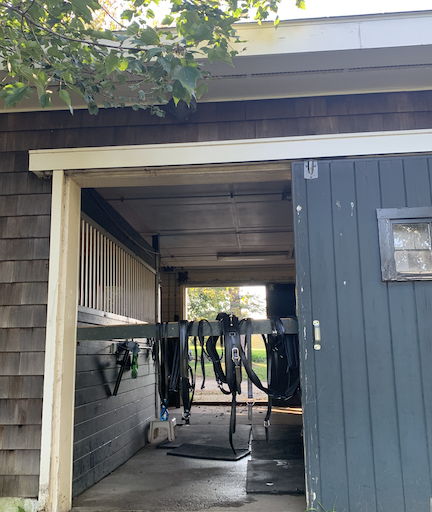

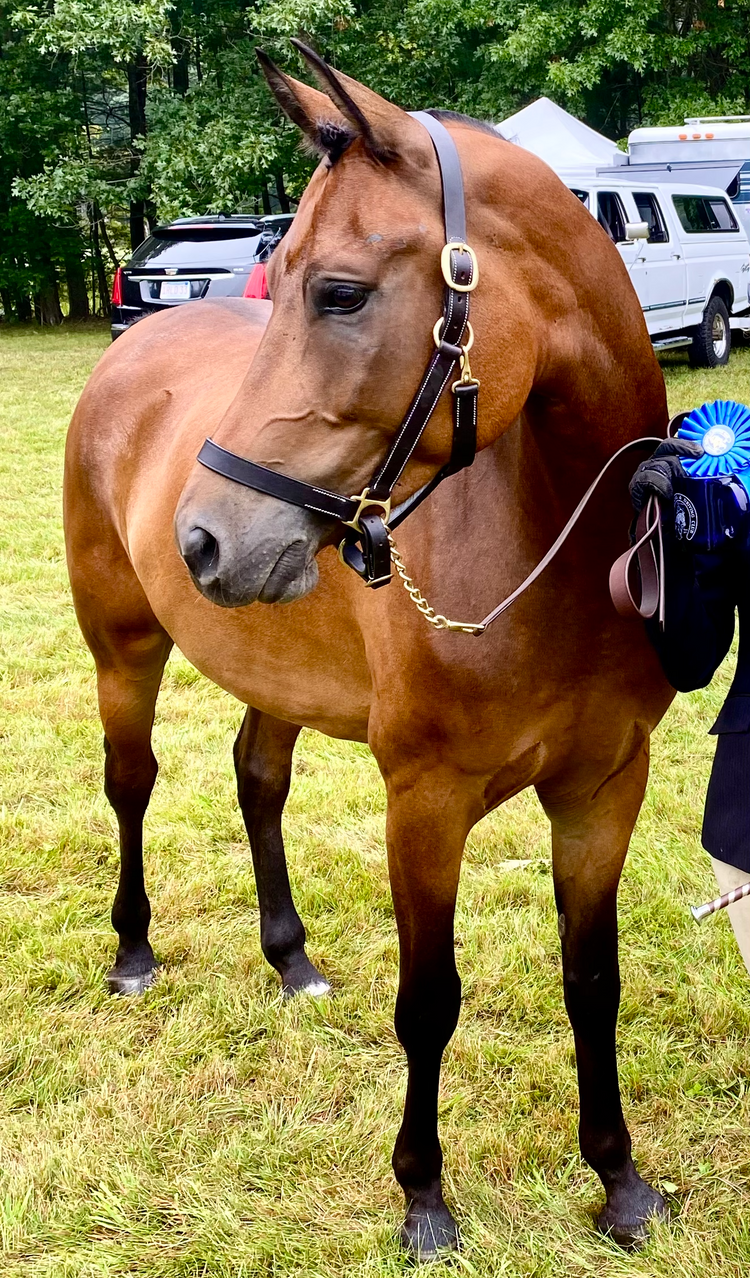
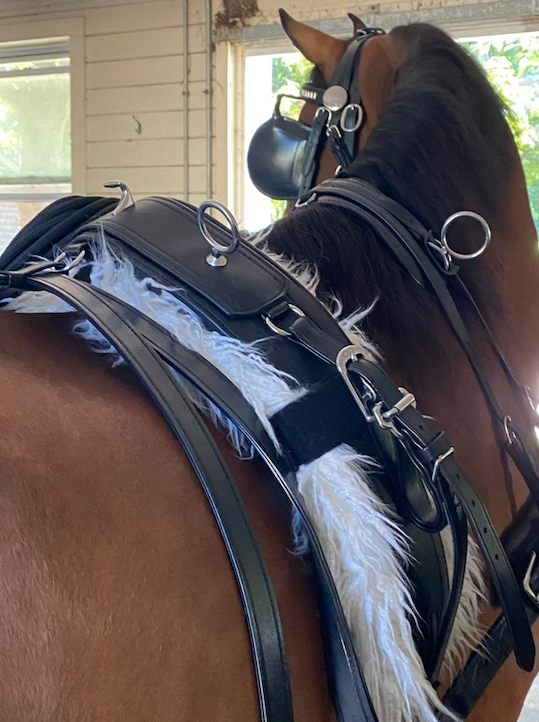
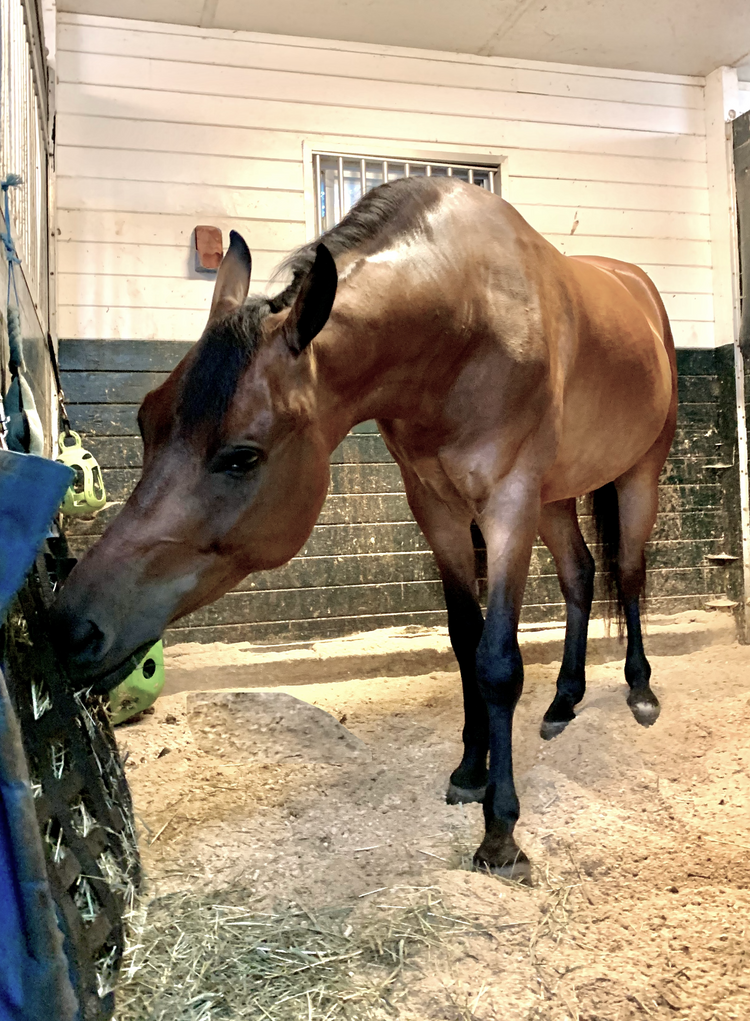
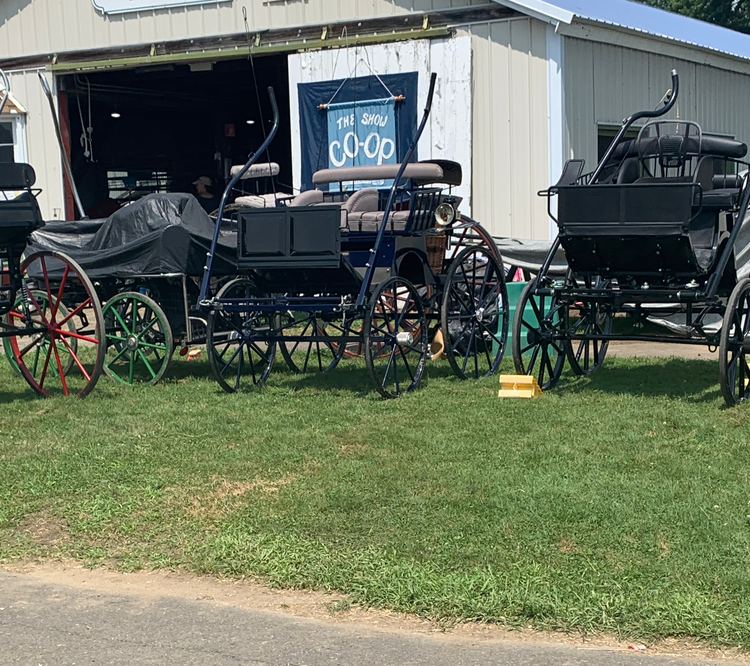
Member discussion